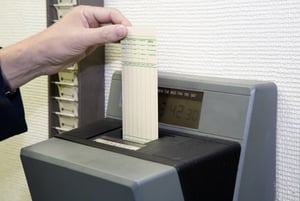 Many businesses have a time tracking system but find that their data isn’t always accurate. There are missed punches, time theft, and confusion among staff on how to properly use the system. Instead of being able to mine useable data to improve the business, the time tracking system becomes a source of frustration for upper management and HR.
Many businesses have a time tracking system but find that their data isn’t always accurate. There are missed punches, time theft, and confusion among staff on how to properly use the system. Instead of being able to mine useable data to improve the business, the time tracking system becomes a source of frustration for upper management and HR.
If you want to make sure your time tracking system is an accurate reflection of your employees’ hours, start with these four tips.
Crack Down On Missed Punches
It’s human nature to forget and even the most dedicated workforce will have a few missed punches where managers go in after the fact to clock an employee in or out. Letting those mistakes turn into the status quo though can negatively affect the accuracy of your time tracking system.
Often, when employers don’t stress the importance of accurate time keeping, managers don’t enforce the rules surrounding them. Implementing a system for tracking employee punches and addressing consistent missed punches with employees is essential to accuracy. Make sure all staff know the importance of accurate time keeping and how to achieve that accuracy.
Consider Biometrics
If you’re looking to curb buddy punches and time theft, you can’t get much more accuracy than you can with a biometric time tracking system. Biometrics require employee presence for timekeeping by logging time with a fingerprint or hand print. Since employees can never forget to bring their hand into work, like they can a badge or punch card, there’s no reason to miss clocking in or out.
Using a biometric time tracking system also helps reduce time spent maintaining your time tracking system by eliminating the need to produce employee badges. If you feel your accuracy is being lost to time theft or employee neglect, biometric time tracking systems can help achieve better accuracy.
Optimize Your System
Sometimes the lack of accuracy in your time tracking system has nothing to do with personnel and everything to do with the actual system. Whether the system wasn’t implemented correctly or your organization offers inadequate training in its use, having a confusing system can negatively affect the quality of your data.
Take a look at your current system to ask yourself whether it works with your company and whether it's time to implement a new time tracking system. Focus on what benefits you aren’t taking advantage of and which don’t work for your company. By optimizing your current system or selecting a new one, you can gather more information and increase the accuracy of your time tracking system.
Eliminate Manual Processes
Even when it’s an accident, human error can seriously undermine the usefulness of your time tracking system. Reducing and eliminating manual processes is one way to improve the accuracy of your system while also reducing the workload of your staff. Creating automated messages that alert managers when overtime will occur and when employees are missing punches are just a few ways a time keeping system can help improve accuracy and increase efficiency in your business. Focus on making the system work for the employees, not the other way around, by eliminating unnecessary manual processes.
Implementing an effective time tracking system can help reduce the 11 percent of profits lost to payroll fraud, 25 percent in small businesses, annually. These four tips can help improve the accuracy of your time tracking system to help reduce and eliminate those losses.
